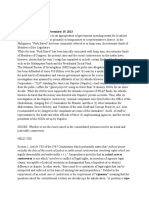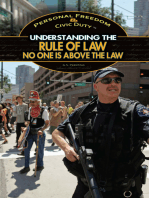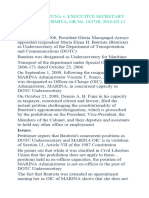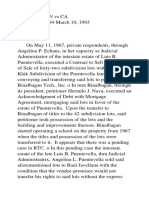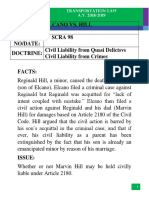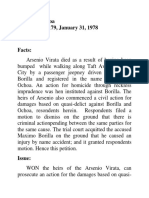0 ratings0% found this document useful (0 votes)
32 viewsDavid vs. Gloria Macapagal-Arroyo G.R. No. 171396 CASE DIGEST
David vs. Gloria Macapagal-Arroyo G.R. No. 171396 CASE DIGEST
Uploaded by
Brenda de la GenteThis case involves 7 petitions challenging the validity of Proclamation No. 1017 issued by President Gloria Macapagal-Arroyo declaring a state of national emergency. The issues are whether PP 1017 arrogated upon the President the power to enact laws and decrees, and if so, whether PP 1017 is unconstitutional. The Supreme Court rules that while the President has the power to ensure that laws are faithfully executed, PP 1017 is unconstitutional insofar as it grants the President the authority to promulgate "decrees", as legislative power belongs solely with Congress. The Court also finds that the President cannot enforce decrees, as they are void, nor can she use the military to enforce all laws
Copyright:
© All Rights Reserved
Available Formats
Download as DOCX, PDF, TXT or read online from Scribd
David vs. Gloria Macapagal-Arroyo G.R. No. 171396 CASE DIGEST
David vs. Gloria Macapagal-Arroyo G.R. No. 171396 CASE DIGEST
Uploaded by
Brenda de la Gente0 ratings0% found this document useful (0 votes)
32 views3 pagesThis case involves 7 petitions challenging the validity of Proclamation No. 1017 issued by President Gloria Macapagal-Arroyo declaring a state of national emergency. The issues are whether PP 1017 arrogated upon the President the power to enact laws and decrees, and if so, whether PP 1017 is unconstitutional. The Supreme Court rules that while the President has the power to ensure that laws are faithfully executed, PP 1017 is unconstitutional insofar as it grants the President the authority to promulgate "decrees", as legislative power belongs solely with Congress. The Court also finds that the President cannot enforce decrees, as they are void, nor can she use the military to enforce all laws
Original Description:
David vs. Gloria Macapagal-Arroyo G.R. No. 171396 CASE DIGEST
Copyright
© © All Rights Reserved
Available Formats
DOCX, PDF, TXT or read online from Scribd
Share this document
Did you find this document useful?
Is this content inappropriate?
This case involves 7 petitions challenging the validity of Proclamation No. 1017 issued by President Gloria Macapagal-Arroyo declaring a state of national emergency. The issues are whether PP 1017 arrogated upon the President the power to enact laws and decrees, and if so, whether PP 1017 is unconstitutional. The Supreme Court rules that while the President has the power to ensure that laws are faithfully executed, PP 1017 is unconstitutional insofar as it grants the President the authority to promulgate "decrees", as legislative power belongs solely with Congress. The Court also finds that the President cannot enforce decrees, as they are void, nor can she use the military to enforce all laws
Copyright:
© All Rights Reserved
Available Formats
Download as DOCX, PDF, TXT or read online from Scribd
Download as docx, pdf, or txt
0 ratings0% found this document useful (0 votes)
32 views3 pagesDavid vs. Gloria Macapagal-Arroyo G.R. No. 171396 CASE DIGEST
David vs. Gloria Macapagal-Arroyo G.R. No. 171396 CASE DIGEST
Uploaded by
Brenda de la GenteThis case involves 7 petitions challenging the validity of Proclamation No. 1017 issued by President Gloria Macapagal-Arroyo declaring a state of national emergency. The issues are whether PP 1017 arrogated upon the President the power to enact laws and decrees, and if so, whether PP 1017 is unconstitutional. The Supreme Court rules that while the President has the power to ensure that laws are faithfully executed, PP 1017 is unconstitutional insofar as it grants the President the authority to promulgate "decrees", as legislative power belongs solely with Congress. The Court also finds that the President cannot enforce decrees, as they are void, nor can she use the military to enforce all laws
Copyright:
© All Rights Reserved
Available Formats
Download as DOCX, PDF, TXT or read online from Scribd
Download as docx, pdf, or txt
You are on page 1of 3
Prof. Randolf S. David vs.
Gloria
Macapagal-Arroyo G.R. No. 171396,
May 3, 2006
Prof. Randolf S. David vs. Gloria Macapagal-Arroyo
G.R. No. 171396, May 3, 2006
FACTS:
These 7 consolidated petitions question the validity of PP
1017 (declaring a state of national emergency) and
General Order No. 5 issued by President Gloria
Macapagal-Arroyo. While the cases are pending,
President Arroyo issued PP 1021, declaring that the state
of national emergency has ceased to exist, thereby, in
effect, lifting PP 1017.
ISSUE:
* Whether or not PP 1017 and G.O. No. 5 arrogated upon
the President the power to enact laws and decrees
* If so, whether or not PP 1017 and G.O. No. 5 are
unconstitutional
HELD:
“Take-Care” Power
This refers to the power of the President to ensure that the
laws be faithfully executed, based on Sec. 17, Art. VII:
“The President shall have control of all the executive
departments, bureaus and offices. He shall ensure that the
laws be faithfully executed.”
As the Executive in whom the executive power is vested,
the primary function of the President is to enforce the laws
as well as to formulate policies to be embodied in existing
laws. He sees to it that all laws are enforced by the
officials and employees of his department. Before
assuming office, he is required to take an oath or
affirmation to the effect that as President of the
Philippines, he will, among others, “execute its laws.” In
the exercise of such function, the President, if needed,
may employ the powers attached to his office as the
Commander-in-Chief of all the armed forces of the
country, including the Philippine National Police under the
Department of Interior and Local Government.
The specific portion of PP 1017 questioned is the enabling
clause: “to enforce obedience to all the laws and to all
decrees, orders and regulations promulgated by me
personally or upon my direction.”
Is it within the domain of President Arroyo to promulgate
“decrees”?
The President is granted an Ordinance Power under
Chap. 2, Book III of E.O. 292. President Arroyo’s
ordinance power is limited to those issuances mentioned
in the foregoing provision. She cannot issue decrees
similar to those issued by Former President Marcos under
PP 1081. Presidential Decrees are laws which are of the
same category and binding force as statutes because they
were issued by the President in the exercise of his
legislative power during the period of Martial Law under
the 1973 Constitution.
This Court rules that the assailed PP 1017 is
unconstitutional insofar as it grants President Arroyo the
authority to promulgate “decrees.” Legislative power is
peculiarly within the province of the Legislature. Sec. 1,
Art. VI categorically states that “the legislative power shall
be vested in the Congress of the Philippines which shall
consist of a Senate and a House of Representatives.” To
be sure, neither Martial Law nor a state of rebellion nor a
state of emergency can justify President Arroyo’s exercise
of legislative power by issuing decrees.
But can President Arroyo enforce obedience to all decrees
and laws through the military?
As this Court stated earlier, President Arroyo has no
authority to enact decrees. It follows that these decrees
are void and, therefore, cannot be enforced. With respect
to “laws,” she cannot call the military to enforce or
implement certain laws, such as customs laws, laws
governing family and property relations, laws on
obligations and contracts and the like. She can only order
the military, under PP 1017, to enforce laws pertinent to its
duty to suppress lawless violence.
You might also like
- StatCon Case DigestsDocument11 pagesStatCon Case DigestsJay Yumang0% (1)
- US Contempt Judgment On Bongbong Marcos RedactedDocument14 pagesUS Contempt Judgment On Bongbong Marcos RedactedRappler100% (1)
- Obligations and Contracts Bayla Vs Silang Traffic Co 73 Phil 557 February 7, 2020 CASE DIGESTDocument4 pagesObligations and Contracts Bayla Vs Silang Traffic Co 73 Phil 557 February 7, 2020 CASE DIGESTBrenda de la GenteNo ratings yet
- Stop HuntDocument115 pagesStop HuntAaron Nambatac100% (3)
- Challenges and alternatives towards peacebuilding: A rural development perspectiveFrom EverandChallenges and alternatives towards peacebuilding: A rural development perspectiveNo ratings yet
- David v. Arroyo, G.R. No. 171396, May 3, 2006Document3 pagesDavid v. Arroyo, G.R. No. 171396, May 3, 2006Sej CaballesNo ratings yet
- Statcon 1abcDocument17 pagesStatcon 1abcDenzelle FelicianoNo ratings yet
- David Vs Gma OthersDocument5 pagesDavid Vs Gma Othersanon_360675804No ratings yet
- 4 David V ArroyoDocument2 pages4 David V ArroyoBluebells33No ratings yet
- NOTES On The Executive DepartmentDocument12 pagesNOTES On The Executive DepartmentArcale John DeracoNo ratings yet
- David vs. ErmitaDocument5 pagesDavid vs. ErmitaCinNo ratings yet
- David V Arroyo PDFDocument3 pagesDavid V Arroyo PDFJoycee ArmilloNo ratings yet
- David Vs Arroyo (GR 171396)Document1 pageDavid Vs Arroyo (GR 171396)Benedicto PintorNo ratings yet
- (CD) David V ArroyoDocument3 pages(CD) David V ArroyoRaineNo ratings yet
- David vs. ArroyoDocument5 pagesDavid vs. ArroyoCarla EspinoNo ratings yet
- David Vs Macapagal-ArroyoDocument15 pagesDavid Vs Macapagal-ArroyoArbee ArquizaNo ratings yet
- BATCH NOTESDocument24 pagesBATCH NOTESJonah Fe AcunoNo ratings yet
- G.R. No. 171396, May 3 2006 (Legislative Department - Power To Declare War and Delegate Emergency Power) FactsDocument83 pagesG.R. No. 171396, May 3 2006 (Legislative Department - Power To Declare War and Delegate Emergency Power) FactsKlein Carlo100% (1)
- Digest Heirs of Julao V de JesusDocument3 pagesDigest Heirs of Julao V de JesusJenicaNo ratings yet
- David Vs ArroyoDocument5 pagesDavid Vs ArroyoCarl IlaganNo ratings yet
- Estrada Vs Arroyo Case DigestDocument3 pagesEstrada Vs Arroyo Case DigestIkkinNo ratings yet
- Lecture On Article Vii: Executive Department: By: Atty. Edwin E. TorresDocument16 pagesLecture On Article Vii: Executive Department: By: Atty. Edwin E. TorresIsah IlejayNo ratings yet
- Ferdinand E. Marcos vs. Hon. Raul MANGLAPUS (177 SCRA 668) Case DigestDocument9 pagesFerdinand E. Marcos vs. Hon. Raul MANGLAPUS (177 SCRA 668) Case DigestThina ChiiNo ratings yet
- David Vs Arroyk Case DigestDocument1 pageDavid Vs Arroyk Case DigestJonalyn G. De RamosNo ratings yet
- David v. Arroyo (Pol)Document3 pagesDavid v. Arroyo (Pol)Roland MarananNo ratings yet
- David V MacapagalDocument4 pagesDavid V MacapagalCyrus Vincent TroncoNo ratings yet
- Executive Dept (Case Digest)Document7 pagesExecutive Dept (Case Digest)Juris FormaranNo ratings yet
- 1301 David Vs Macapagal DigestDocument2 pages1301 David Vs Macapagal DigestLennart Reyes100% (3)
- 489 Scra 160Document4 pages489 Scra 160thefiledetectorNo ratings yet
- Bengzon Vs Secretary of Justice & Insular Auditor, 62 Phil 912, G.R. No. 4282, January 18, 1936Document14 pagesBengzon Vs Secretary of Justice & Insular Auditor, 62 Phil 912, G.R. No. 4282, January 18, 1936Inday LibertyNo ratings yet
- David Vs Macapagal ArroyoDocument3 pagesDavid Vs Macapagal ArroyoAlvin Marcelino BaulosNo ratings yet
- 1B Statutory Construction Module 1Document20 pages1B Statutory Construction Module 1Mary Ann AmbitaNo ratings yet
- Finals ReviewerDocument37 pagesFinals ReviewerTeresa Dumangas BuladacoNo ratings yet
- General (Plenary) Legislative PowerDocument162 pagesGeneral (Plenary) Legislative PowerBrenda de la GenteNo ratings yet
- En Banc: Synopsis SynopsisDocument54 pagesEn Banc: Synopsis SynopsisDuffy DuffyNo ratings yet
- A.Legislative Power I. in General Sense David vs. Arroyo: FactsDocument48 pagesA.Legislative Power I. in General Sense David vs. Arroyo: FactsRosalou SamaniegoNo ratings yet
- Reviewer DigestDocument18 pagesReviewer DigestGhost RiderNo ratings yet
- Judicial Department Case DigestDocument31 pagesJudicial Department Case DigestJanelleNo ratings yet
- Number 3 CasesDocument7 pagesNumber 3 CasesTrudi B. CariñoNo ratings yet
- The Earliest Opportunity, Constitutional Issue Is "Lis Mota" To The CaseDocument3 pagesThe Earliest Opportunity, Constitutional Issue Is "Lis Mota" To The Caseavocado booksNo ratings yet
- David Vs ArroyoDocument6 pagesDavid Vs ArroyoMendoza Eller-jed ManalacNo ratings yet
- Executive Department DigestsDocument81 pagesExecutive Department DigestsJerome LeañoNo ratings yet
- David Et Al Vs ErmitaDocument3 pagesDavid Et Al Vs ErmitaRoss LyneNo ratings yet
- Case Digest David V ArroyoDocument2 pagesCase Digest David V ArroyoYanie Sajor QuintoNo ratings yet
- Case Digests 4th Batch Fusi v2Document10 pagesCase Digests 4th Batch Fusi v2JurisNo ratings yet
- The Legislative PowerDocument245 pagesThe Legislative PowerChris aribasNo ratings yet
- David Vs MacapagalDocument11 pagesDavid Vs MacapagalSecret StudentNo ratings yet
- Sanlakas v. Executive Secretary, G.R. No. 159085, February 3, 2004Document7 pagesSanlakas v. Executive Secretary, G.R. No. 159085, February 3, 2004maricar_roca100% (1)
- Quizzer and EmergencyDocument8 pagesQuizzer and EmergencytrishortizNo ratings yet
- (A26) LAW 121 - Sanlakas vs. Executive Secretary (G.R. No. 159085)Document4 pages(A26) LAW 121 - Sanlakas vs. Executive Secretary (G.R. No. 159085)mNo ratings yet
- Pre-Bar Quizzer in Political Law - Part I Constitution of Government 51-60Document3 pagesPre-Bar Quizzer in Political Law - Part I Constitution of Government 51-60Jayvee DividinaNo ratings yet
- Hon. Executive Secretary, Et Al.) Are Officers/members ofDocument15 pagesHon. Executive Secretary, Et Al.) Are Officers/members ofRobielyn Kate NerpioNo ratings yet
- Consti Cases Sept 21Document2 pagesConsti Cases Sept 21Ten AmbitoNo ratings yet
- David Vs Macapagal-ArroyoDocument4 pagesDavid Vs Macapagal-Arroyochappy_leigh118No ratings yet
- People vs. Maceren 79 SCRA 450Document3 pagesPeople vs. Maceren 79 SCRA 450eeeee1191No ratings yet
- David V Arroyo DigestDocument4 pagesDavid V Arroyo DigestDonn LinNo ratings yet
- Republic V SandiganDocument4 pagesRepublic V SandiganGLORILYN MONTEJONo ratings yet
- 115 Scra 418Document15 pages115 Scra 418Fran SuarezNo ratings yet
- KEY DOCTRINE: Under The Calling-Out Power, The President May SummonDocument3 pagesKEY DOCTRINE: Under The Calling-Out Power, The President May SummonHanna QuiambaoNo ratings yet
- Amor Legis: Providing Resources For Future LawyersDocument3 pagesAmor Legis: Providing Resources For Future LawyersstrgrlNo ratings yet
- A. Executive Power: Marcos V ManglapusDocument5 pagesA. Executive Power: Marcos V ManglapusDustin NitroNo ratings yet
- Summary: The Constitution in Exile: Review and Analysis of Andrew P. Napolitano's BookFrom EverandSummary: The Constitution in Exile: Review and Analysis of Andrew P. Napolitano's BookRating: 5 out of 5 stars5/5 (1)
- DENNIS A. B. FUNA v. EXECUTIVE SECRETARY EDUARDO R. ERMITA, GR No. 184740 CASE DIGESTDocument5 pagesDENNIS A. B. FUNA v. EXECUTIVE SECRETARY EDUARDO R. ERMITA, GR No. 184740 CASE DIGESTBrenda de la GenteNo ratings yet
- Escaño v. Ortigas (G.R. No. 151953, June 29, 2007)Document11 pagesEscaño v. Ortigas (G.R. No. 151953, June 29, 2007)Brenda de la GenteNo ratings yet
- Security Bank and Trust Company v. RTCDocument12 pagesSecurity Bank and Trust Company v. RTCBrenda de la GenteNo ratings yet
- The Consolidated Bank and Trust Corporation vs. Court of AppealsDocument20 pagesThe Consolidated Bank and Trust Corporation vs. Court of AppealsBrenda de la GenteNo ratings yet
- Constitutional Law Belgica Versus Executive Secretary CASE DIGEST2 November 19, 2019Document27 pagesConstitutional Law Belgica Versus Executive Secretary CASE DIGEST2 November 19, 2019Brenda de la GenteNo ratings yet
- Vda de Bautista v. MarcosDocument11 pagesVda de Bautista v. MarcosBrenda de la GenteNo ratings yet
- Obligations and Contracts Binalbagan Tech Inc Vs CA 219 SCRA 777 February 7, 2020 CASE DIGESTDocument3 pagesObligations and Contracts Binalbagan Tech Inc Vs CA 219 SCRA 777 February 7, 2020 CASE DIGESTBrenda de la GenteNo ratings yet
- Obligations and Contracts Elcano Vs Hill 77 SCRA 98 February 7, 2020 CASE DIGESTDocument3 pagesObligations and Contracts Elcano Vs Hill 77 SCRA 98 February 7, 2020 CASE DIGESTBrenda de la GenteNo ratings yet
- Obligations and Contracts Lee Vs de Guzman February 7, 2020 CASE DIGESTDocument5 pagesObligations and Contracts Lee Vs de Guzman February 7, 2020 CASE DIGESTBrenda de la GenteNo ratings yet
- (SM) Petition To Take The Lawyer's Oath by Arthur M. Cuevas, JRDocument1 page(SM) Petition To Take The Lawyer's Oath by Arthur M. Cuevas, JRBrenda de la GenteNo ratings yet
- Legal Profession SYLLABUS 2019Document3 pagesLegal Profession SYLLABUS 2019Brenda de la GenteNo ratings yet
- Obligations and Contracts Baliwag Transit Vs CA 262 SCRA 230 February 7, 2020 CASE DIGESTDocument5 pagesObligations and Contracts Baliwag Transit Vs CA 262 SCRA 230 February 7, 2020 CASE DIGESTBrenda de la GenteNo ratings yet
- Obligations and Contracts Virata Vs Ochoa 81 SCRA 472 February 7, 2020 CASE DIGESTDocument3 pagesObligations and Contracts Virata Vs Ochoa 81 SCRA 472 February 7, 2020 CASE DIGESTBrenda de la GenteNo ratings yet
- Calalas Vs Court of Appeals 332 SCRA 356 May 31 2000 PDFDocument6 pagesCalalas Vs Court of Appeals 332 SCRA 356 May 31 2000 PDFBrenda de la GenteNo ratings yet
- Equity Crowdfunding in Malaysia - A Review On The Legal Challenges and Regulatory Aspects PDFDocument79 pagesEquity Crowdfunding in Malaysia - A Review On The Legal Challenges and Regulatory Aspects PDFAnson LiangNo ratings yet
- Requirements For Deceased DepositorDocument11 pagesRequirements For Deceased Depositorzeus balagtasNo ratings yet
- Federal Deposit Insurance Corporation CLAIMANT VERIFICATIONDocument2 pagesFederal Deposit Insurance Corporation CLAIMANT VERIFICATIONjohn alter100% (2)
- NF724WY4QVG74VT71599 ETicketDocument3 pagesNF724WY4QVG74VT71599 ETicketlace modiNo ratings yet
- (To Be Filled Up in Capital Letter) : Form NoDocument1 page(To Be Filled Up in Capital Letter) : Form Noomprakash pal100% (2)
- Why Indian Electoral Bonds Are Undemocratic 1666150423Document4 pagesWhy Indian Electoral Bonds Are Undemocratic 1666150423Animesh KumarNo ratings yet
- Service Centers - Fossil PDFDocument12 pagesService Centers - Fossil PDFMohammed Yassar SayedNo ratings yet
- Work Residence Permit VisaDocument2 pagesWork Residence Permit VisarejithNo ratings yet
- 5 Ways To Maintain Patient ConfidentialityDocument2 pages5 Ways To Maintain Patient ConfidentialityPrincess BalloNo ratings yet
- Revolution in Our Time by Kekla Magoon Chapter SamplerDocument80 pagesRevolution in Our Time by Kekla Magoon Chapter SamplerCandlewick Press100% (1)
- Bhupendra Singh Icici Jaipur Policy 01Document3 pagesBhupendra Singh Icici Jaipur Policy 01Brijesh EnterprisesNo ratings yet
- Employee Leave PolicyDocument7 pagesEmployee Leave PolicyDeshna sachan100% (1)
- SSRN Id3686619Document34 pagesSSRN Id3686619Rafique KhanNo ratings yet
- Group of CompaniesDocument6 pagesGroup of Companiesraisul100% (2)
- HAECO Job Applicant Declaration Form - FORM0W00086R01 - 202305 (AGUNG.P)Document2 pagesHAECO Job Applicant Declaration Form - FORM0W00086R01 - 202305 (AGUNG.P)tenhero92No ratings yet
- 08.0 PP 23 32 Prologue Yudhoyonos Legacy An Insiders ViewDocument10 pages08.0 PP 23 32 Prologue Yudhoyonos Legacy An Insiders ViewKilitus WetipoNo ratings yet
- Herras Teehankee Vs RoviraDocument2 pagesHerras Teehankee Vs RoviraDanielle Ray V. Velasco100% (2)
- Jail-Time Credit Quick Reference GuideDocument2 pagesJail-Time Credit Quick Reference GuideDonNo ratings yet
- HRM - Chap4. Personnel Planning and RecruitingDocument28 pagesHRM - Chap4. Personnel Planning and RecruitingHuyền MaiNo ratings yet
- Confidentiality and Intellectual Property Assignment AgreementDocument8 pagesConfidentiality and Intellectual Property Assignment Agreementomsi.atribizNo ratings yet
- Full Chapter After Ancient Biography Modern Types and Classical Archetypes Robert Fraser PDFDocument53 pagesFull Chapter After Ancient Biography Modern Types and Classical Archetypes Robert Fraser PDFedna.luke904100% (11)
- YBP MOA FOR REPLICATION OCT 14 Converted 1Document5 pagesYBP MOA FOR REPLICATION OCT 14 Converted 1nelrizafortea949No ratings yet
- PHILPOL - Q1W1 (Politics, Government and Governance)Document45 pagesPHILPOL - Q1W1 (Politics, Government and Governance)samuel fajiculayNo ratings yet
- Steven Murff Termination LetterDocument2 pagesSteven Murff Termination LetterUSA TODAY NetworkNo ratings yet
- Approved TGP Global Consti Final VersionDocument16 pagesApproved TGP Global Consti Final Versionbikereat1No ratings yet
- Gee 102 4Document2 pagesGee 102 4Sunshine AmaracoNo ratings yet
- Law of ContractDocument20 pagesLaw of ContractUtsav VermaNo ratings yet
- Ward Votes KTMDocument2 pagesWard Votes KTMArtistic PlatinumNo ratings yet





































